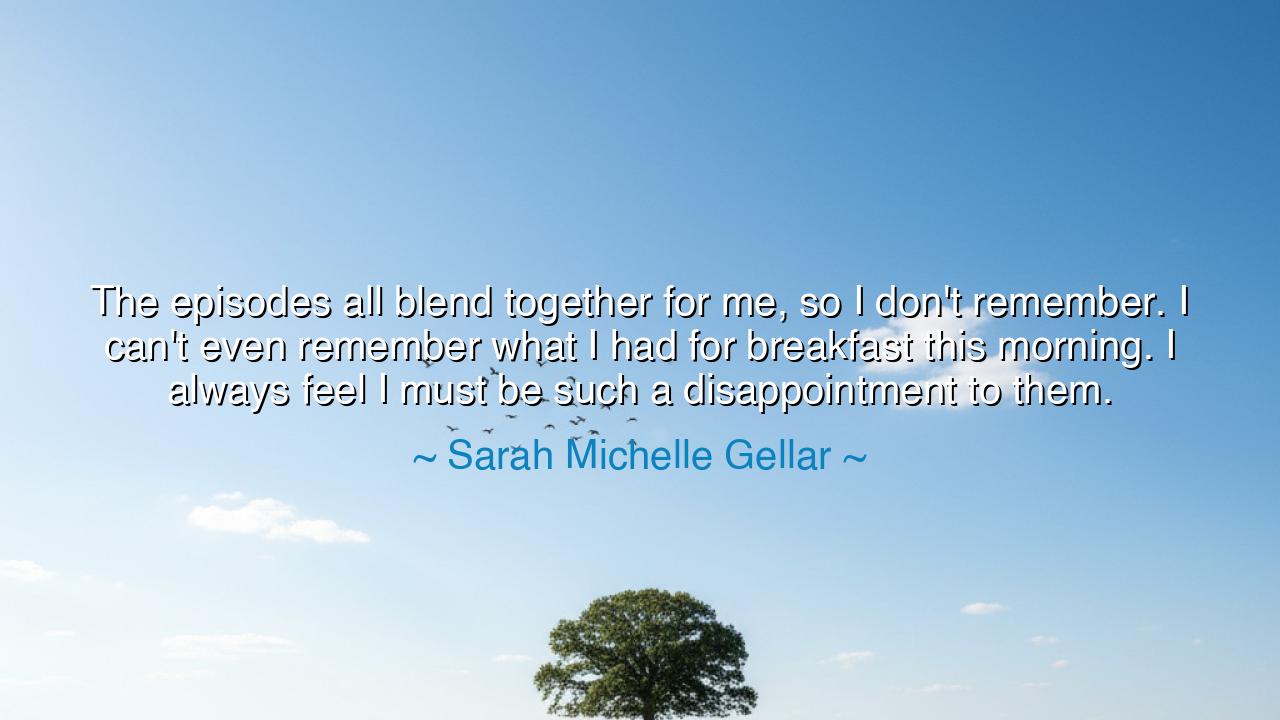
The episodes all blend together for me, so I don't remember. I
The episodes all blend together for me, so I don't remember. I can't even remember what I had for breakfast this morning. I always feel I must be such a disappointment to them.






"The episodes all blend together for me, so I don't remember. I can't even remember what I had for breakfast this morning. I always feel I must be such a disappointment to them." These words from Sarah Michelle Gellar speak to the delicate nature of memory, expectation, and the weight of living up to others’ perceptions. Gellar’s reflection highlights a very human experience—the inability to remember the smallest details, to keep track of every moment in the whirlwind of life. It is a reminder that life, much like time, is often experienced in a blur, and sometimes, we are left with the feeling that we are not living up to the expectations placed upon us—whether by ourselves or others. This struggle between the present and the past, between what we can remember and what is forgotten, can make us feel as if we are failing, even when we are simply human.
In the ancient world, memory was a powerful force. The Greeks, with their rich traditions of oral storytelling, placed immense importance on the act of remembering. The epic poets like Homer were not just chroniclers of the past; they were the keepers of history, tasked with preserving the stories of heroes, gods, and battles through the spoken word. Yet, even Homer, who weaves tales of grand adventures, was keenly aware that memory is not always perfect. Achilles's rage in the Iliad, for example, is sparked by the loss of a beloved friend, yet it is also a reflection of the frustration of a man who has been swept up by time and circumstance, unable to remember the deeper lessons he has learned. Gellar’s words echo this ancient struggle—what do we do when memory fails us? When the weight of expectations blurs the clarity of our journey?
Consider Socrates, the philosopher who famously declared, "The unexamined life is not worth living." Yet even Socrates, with all his wisdom, must have been aware of how easily the mind can forget, how fleeting moments can slip away. His method of questioning, of turning over each idea, was in part an attempt to clarify the murky waters of memory and consciousness. Socrates sought to understand the truths of life, not by clinging to every detail, but by probing the essence of existence. He understood that understanding does not come from recalling every single event but from reflecting on the patterns of our actions and the wisdom we gain over time. Gellar’s acknowledgment that she cannot remember every episode or detail is a form of humility, a recognition that the true meaning of life does not lie in the minutiae but in the larger lessons we learn.
The Romans, too, revered memory, but they also recognized its fragility. Cicero, one of Rome’s greatest orators, often spoke about the importance of mindfulness and clarity of thought. He believed that true greatness came not from recalling every event with perfect accuracy but from learning from the ebb and flow of time, from understanding the present moment and using that to shape the future. Even the great Julius Caesar, whose name became synonymous with power, struggled with the passage of time and the impact of his legacy. His memoirs were an attempt to preserve his greatness for posterity, yet, even he must have known that no memory could capture the full measure of a man’s life. Like Gellar, Caesar was aware of the tension between what is remembered and what is lost in the fog of time.
The lesson to take from Gellar’s words is one of acceptance and self-compassion. It is easy to fall into the trap of believing that we must remember everything, that we must live up to the expectations placed upon us by others or by our own standards. But the truth is that memory is not a perfect guide; it is shaped by our emotions, our experiences, and the passage of time. Gellar’s feeling of disappointment may arise from the pressure to be perfect, to meet the impossible task of recalling every detail of her life, but in truth, perfection is not the goal. The goal is to embrace the imperfection of memory and to find meaning in the moments that truly matter, knowing that we are not defined by our ability to remember, but by how we live.
In practical terms, we must learn to let go of the need to recall every event with precision and instead focus on the bigger picture. Like Socrates, we must ask ourselves the right questions, not to remember every moment but to understand the meaning behind them. In our busy lives, it is easy to feel overwhelmed by the constant rush of time, but we must remember that the act of living is not about filling our minds with endless details. It is about finding wisdom in the patterns of our experiences, in how we respond to the challenges we face, and in the lessons we learn along the way.
Ultimately, the lesson is that we must give ourselves grace. Memory is not always a perfect reflection of our lives, but that does not mean we are failing. Instead of focusing on what we forget, we must honor what we remember—the lessons, the relationships, the growth. Just as the ancients acknowledged the fragility of memory, so must we. By accepting that we do not need to recall every detail, we free ourselves from the burden of expectation and allow ourselves to truly live in the present, knowing that the true measure of a life well-lived is not in perfect recollection, but in the meaning we create with each passing day.






AAdministratorAdministrator
Welcome, honored guests. Please leave a comment, we will respond soon